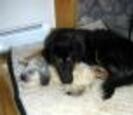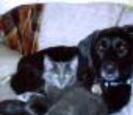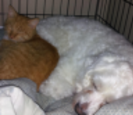All Care Guides
Kenneling Your Cat
-
Even being in the best kennel is stressful for many cats. If your cat does not tolerate boarding well, consider using a pet sitter or arranging for your cat to stay in a room at a friend’s or relative’s house while you are traveling. If kenneling your cat is your only option, the following guidelines can help improve your cat’s stay at a kennel.
Read More Kenneling Your Dog
-
Even being in the best kennel is stressful for many dogs. If your dog does not tolerate boarding well, consider using a pet sitter or arranging for your dog to stay with a friend or relative while you are traveling. If kenneling your dog is your only option, the following guidelines can help improve your dog’s stay at a kennel.
Read More Kitten Socialization
-
Socialization is the learning process through which a kitten becomes accustomed to being near various people, animals, and environments. By exposing kittens to different stimuli in a positive or neutral way, before they can develop a fear of these things, owners can reduce the likelihood of behavior problems in the future and help build a stronger bond between pets and the rest of the family. The critical time to socialize a kitten is during the first 3 to 4 months of its life.
Read More Kitten or Adult Cat: Which Is Right for You?
-
Adopting a cat or a kitten is an important decision that can affect the next 15 to 20 years of your life. Adequate time should be taken to decide whether a cat or a kitten is right for you and your lifestyle. A new cat should be obtained from either a reputable breeder or an adoption shelter. Ask your veterinarian for recommendations on breeders or shelters in your area.
Read More Leptospirosis
-
Leptospirosis is a potentially serious disease caused by the bacterium Leptospira interrogans. It affects dogs but can also infect a wide variety of domestic and wild animals and humans. The bacteria can survive for long periods of time in water and are frequently found in swamps, streams, lakes, and standing water. The bacteria also survive well in mud and moist soil, and localized outbreaks can occur after flooding. Infected animals can continue to shed the bacteria in their urine for months or even years after recovery. Carriers of the bacteria include raccoons, opossums, rodents, skunks, and dogs. The disease is transmitted to dogs when they have contact with urine or contaminated water or soil.
Read More


































